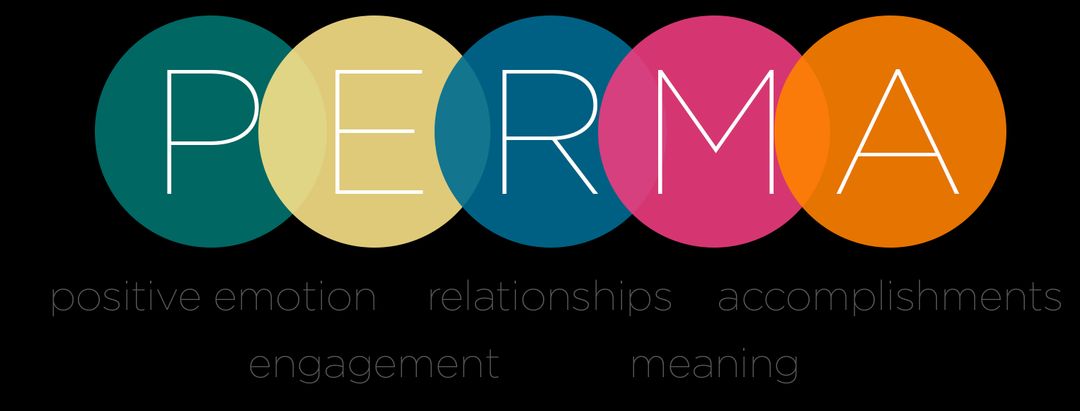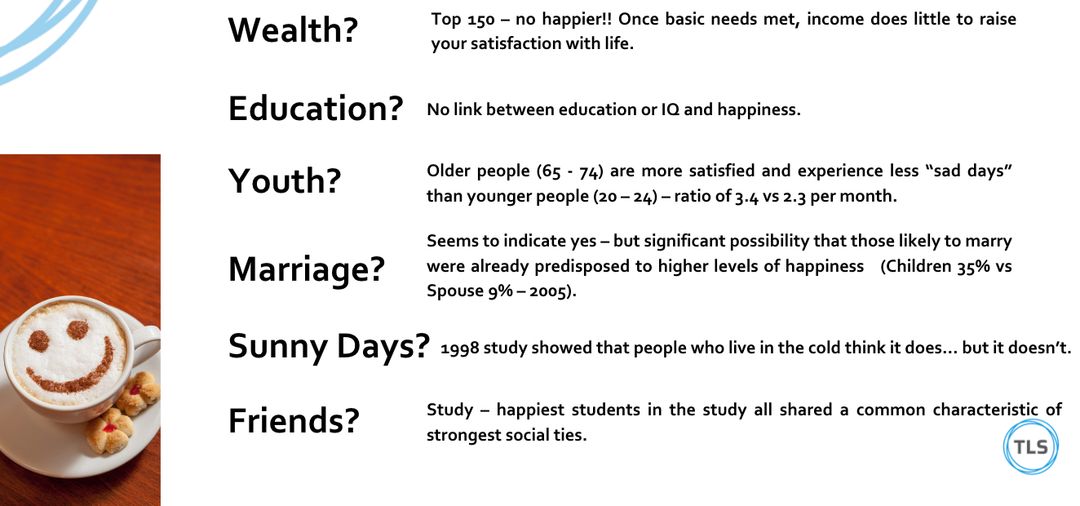

Permah & Happiness
Instructions
PERMAH (and all it’s variations)

Professor Martin Seligman, one of the world’s leading researchers in positive psychology and human flourishing, suggests that wellbeing is cultivated by the presence in our lives of positive emotion, engagement, relationships, meaning and accomplishment. This framework is often referred to as ‘PERMA’.
POSITIVE EMOTION - the right balance of heartfelt positivity to boost our resilience.
ENGAGEMENT - the regular development of our strengths – those things we’re good at and enjoy doing.
RELATIONSHIPS - the creation of authentic, energizing connections.
MEANING - a sense of connection to something bigger than ourselves.
ACCOMPLISHMENT - the belief and ability to do the things that matter most to us.
HEALTHY - eating well, moving regularly, sleeping deeply.
SLIDE: XX - XX WHAT MAKES YOU HAPPY? AND DEBUNKING SOME MYTHS (OPTIONAL)

Depending who you speak to our listen to, what they might tell you makes them happy varies significantly – here are some typical responses, or “common sense” theories, and the research that sits underneath them may surprise or interest you.
● Wealth? (slide transition wealth banner) Diener’s studies suggest that once your basic needs have been met, and increase in income does little to increase your overall happiness – in fact the top 150 earners in (better keep that one to yourself with bonuses coming up…)
● Education? (slide transition education banner) Well – sorry mum and dad, there is no direct correlation between higher IQ or standard of education and increased happiness – perhaps there is something to be said for blissful ignorance??
● Youth? (slide transition youth banner) So – remember how much happier you seemed to be when you were younger – I certainly remember my dad telling me to stop being so morose because these were the best days of my life – which vaguely worried me sometimes! sometimes we do look at youth with rose tinted glasses – but guess what, the research suggests that people in the older age brackets typically experience less :”sad days” than the younger age brackets – the younger sample group experience 3.4 dad days a month, while those over 65 experienced only 2.3
● Marriage? (slide transition marriage banner) so lots of popular women’s magazines quote this as a statistic – that married people are happier - and married men live longer– I always thought it was a bit of a smug – but hey, guess what, the stats do agree that overall married people seem to be happier – HOWEVER - it also suggests that those who get married may have been more positively disposed in the first place!! And I also found this interesting piece of research which was done with a sample group in Texas – when people were asked what made them happy, 35% said their children or grandchildren – and only 9% said their spouse !!!! (I thought that was funny!!! )
● Sunny Days (slide transition sunny days banner) So here is a surprising one most people think that sunny weather increases overall happiness – including people who live in sunnier climates – but the research demonstrates no such correlation at all. Perhaps if the sample group had included some really extreme weather situations it may have turned out differently).
Friends (slide transition friends banner) a 2002 study of students showed that the top 10% of the happiest students shared one common characteristic – they all had strong ties with friends and family, and all made time to spend with them. Diener (one of the researches) concludes that it’s important to spend time with social skills, interpersonal skills and social support.
Link
We often think that it's the things that happen to and around us that create happiness - and they do impact the daily fluctuations of our experience, and there is more to it than that.
No matter what we experience in our lives – the good the bad and the ugly, we seem to return in short order to our base level of happiness. A substantial body of evidence supports this.
For example a study of lottery winners done in 1978 for example, found that they did not wind up significantly happier than a control group. Even people who lose the use of their limbs o a devastating accident tend to bounce back, though perhaps not all the way to their base line.
One study found that a week after the accident, the injured were severely angry and anxious, but after only 8 weeks, their strongest emotion was happiness, and within 1 – 2 years, their daily experience was not significantly different to their original base levels of happiness ( for the most part)
I was surprised when I first heard this – how could both return to original levels – the paraplegics did because they are not primarily paraplegics, they continue their lives and focus on other things – getting to work, exercising, eating, relating with friends. Their attention is diverted into other arenas, and the base level takes over again. And the same is true for lottery winners over time.
So this sounds like bad news – like happiness can’t shift, but in fact it can shift. You can shift your base line, of happiness.
You need to direct your attention differently, and we will share with you the secrets of what it is you could attend to best increase your overall baseline or set point of happiness.
SLIDE X: HAPPINESS FORMULA (OPTIONAL)
Seligman even came up with a formula: H = S + C + V. Happiness equals your genetic set point plus the circumstances of your life plus factors under voluntary control.

H Stands for your enduring level of happiness
S Is your set range
C Is the circumstances in your life
V Represents factors under your voluntary control





Comments (0)